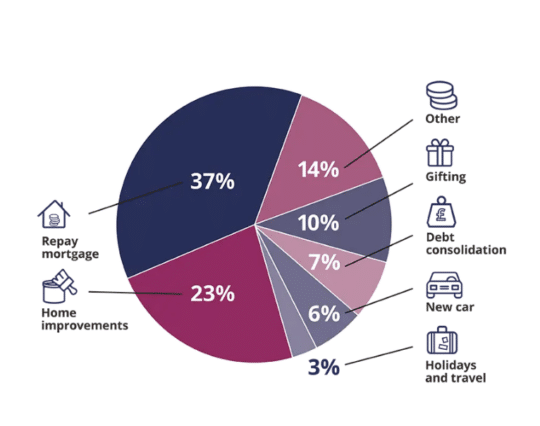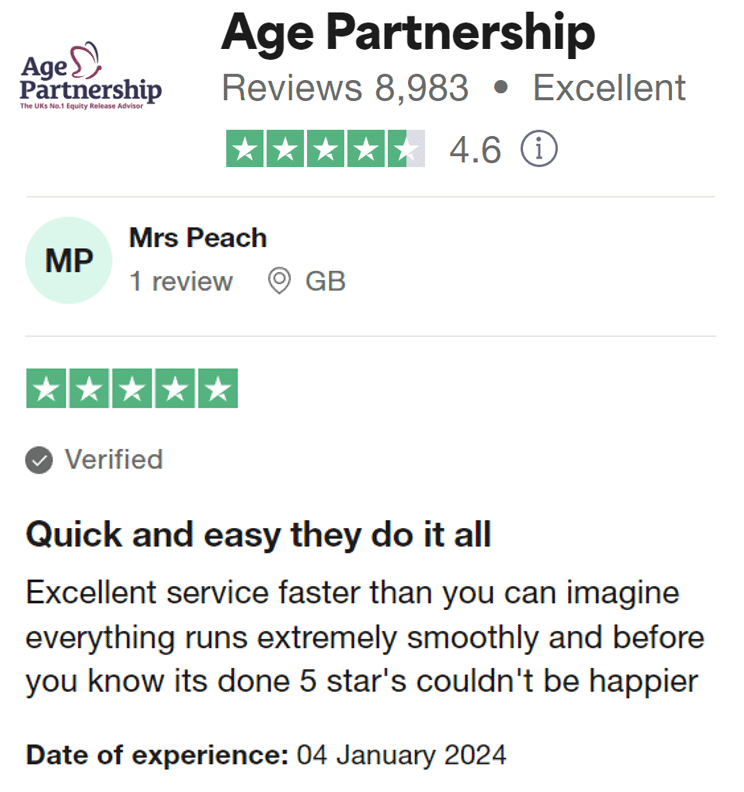The Pros & Cons of Equity Release – is it right for you?
Our preferred equity release adviser is Age Partnership. For free and impartial money advice you can visit MoneyHelper.
Our preferred equity release adviser is Age Partnership. For free and impartial money advice you can visit MoneyHelper.
Are you curious about equity release and want to know if it’s right for you? You’re not alone!
It can be difficult to understand equity release – it’s tricky and full of jargon! – so, we’ve put together this quick guide to help you understand some of the major advantages and potential pitfalls of equity release.
In this post, we’re going to cover:
- Types of equity release
- Potential advantages of equity release
- Potential downfalls of equity release
- Equity release eligibility
- Is equity release right for you?
Types of equity release
Before we dive into the benefits and drawbacks of equity release, we’re going to look at the two different types of equity release that are available:
- Lifetime mortgage, or
- Home reversion.
For a more detailed explanation of these options, you can have a look at our quick guide. You can also contact a debt charity for some free and specialised advice.
Lifetime Mortgage
A lifetime mortgage is basically a mortgage that is secured against your property. You retain ownership of your property until you sell it and repay the mortgage with the proceeds.
You don’t have to sell your property at any particular time, but this is usually done when the last borrower has died or moved into a long-term care facility.
Home Reversion
In home reversion, all or part of your property is sold to your home reversion provider. You do retain the right to live in your property even if you sell all of your home, but you have to maintain and insure it.
When the last borrower dies or moves into a long-term care facility, your property will be sold. The proceeds of the sale are then shared according to the remaining proportions of ownership.
How equity release could help
More than 2 million people have used Age Partnership to release equity since 2004.
How your money is up to you, but here’s what their customers do…
Find out how much equity you could release by clicking the button below.
In partnership with Age Partnership.
What are the advantages of equity release?
Equity release could give you more financial freedom during your retirement. This is because one of the largest advantages is unlocking some of the value of your property as tax-free cash without needing to downsize.
Here is our quick breakdown of some more advantages of equity release:
- You get a tax-free sum of money to spend however you like,
- You don’t have to make any monthly payments unless you want to,
- You retain the right to stay in your home until you move into a long-term care facility or die,
- You can draw smaller amounts when you need them to help keep interest payments down.
Everyone’s finances are different, so equity release could have different benefits for you. You can contact a debt charity for some free and specific advice about equity release.
What are the possible disadvantages of equity release?
Getting some tax-free cash from your property does sound attractive, but there are some potential pitfalls that you need to consider apart from possibly leaving less inheritance than you had planned.
First of all, interest rates can be very high, particularly on lifetime mortgages. This can mean that you leave behind less than you realise for your loved ones.
You also need to make sure that you start an equity release plan with a reputable firm. Any reputable firm will be a member of the Financial Conduct Authority (FCA) and the Equity Release Council.
Any firm that is a member of these organisations will have certain protections and follow set regulations as standard. This means you enjoy certain protections, including a no negative equity guarantee. A no negative equity clause means that your estate will never have to pay more than the value of your property when it is sold.
We recommend getting some professional financial advice before you start an equity release scheme to make sure that you fully understand any potential risks.
Join thousands of others who release equity
Age Partnership have helped over 2 million people release equity from their home.

Mrs Wareham
“I am more than pleased to have taken out Equity Release with Age Partnership.”
Reviews shown are for Age Partnership. Search powered by Age Partnership.
Am I eligible for equity release?
One other potential pitfall of equity release is eligibility – not everyone will qualify for an equity release scheme.
The most common requirement for equity release candidates is age – most providers require you to be 55 or older. But there are some other criteria that you might need to consider:
- Property value: Generally, properties worth £70,000 are the lower limit on what is accepted. There are other requirements – former council houses sometimes have to be worth more than £100,000 to be accepted.
- Property location: Equity release providers have to be sure that your property will sell to get their money back. This might mean you are ineligible for equity release if your property is in a hard-to-sell area.
- Property type: While firms are becoming more accepting of property types, buildings of non-standard construction such as concrete, metal or timber frames are sometimes ineligible.
- Property tenure: You might struggle to qualify for equity release if you have a leasehold rather than a freehold. The longer your remaining lease, the more likely you are to be accepted.
How can I protect myself in equity release?
As we have mentioned above, there are some standard regulations that are followed by reputable firms. Remember, a reputable firm will be a member of the FCA and the Equity Release Council.
The FCA has a whole handbook for members to follow. The Equity Release Council just has five guarantees that all their members must give you:
- No negative equity guarantees so you or your family will never owe more than the value of your property
- The right to stay in your home for life or until you move into a long-term care facility
- The right to make penalty-free partial repayments towards your plan
- Fixed interest rates or interest rates that are capped for the duration of your policy.
Is equity release right for me?
So is equity release right for you? It depends.
As we’ve covered, there are some criteria for equity release that can mean that you’re ineligible anyway. However, firms will have different policies, so you might be able to find a suitable plan if you shop around a bit.
Getting some professional advice is always a good idea, especially if you are considering equity release. There are a number of debt charities that will be able to look at your finances and give you a detailed rundown of your options.




